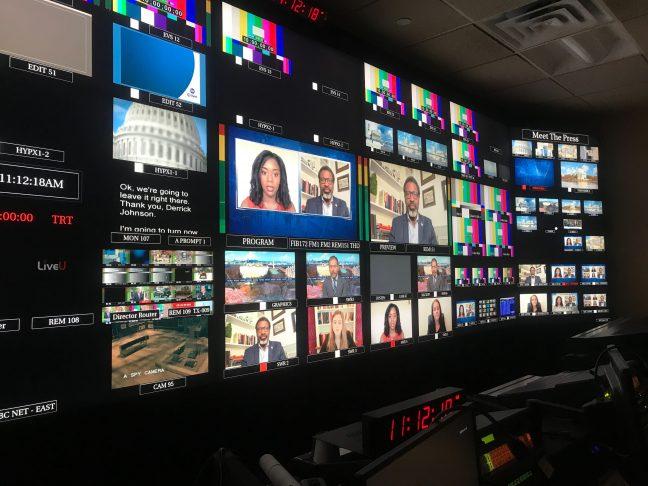Tamia Fowlkes, a University of Wisconsin rising junior, was one of three featured student journalists on this week’s June 5 episode of NBC News’ “Meet the Press: College Roundtable.”
According to a press release, “Meet the Press: College Roundtable” brings together college-aged journalists for a weekly virtual panel discussion. “Meet the Press” moderator Chuck Todd and selected college journalism students interview experts and national figures relating to the week’s topic.
Fowlkes, who is studying journalism and political science, told The Herald she’s had a lifelong passion for journalism.
“I have always been someone who is extremely passionate about journalism and have always recognized its capacity to initiate change within communities and among different groups of people,” Fowlkes said. “I continue to love this career because I am always on the move, always learning something new and constantly interacting with captivating and interesting sources.”
The source this week on “Meet the Press” was Derrick Johnson, President of the National Association for the Advancement of Colored People. Alongside Todd, Fowlkes was joined by students from Princeton University and the University of Florida as members of the interviewing panel.
The week’s topic, Todd told The Herald, was based on the news cycle.
“Every episode focuses on the news of the day and what’s driving the news cycle. This week, as civil unrest and protests continue to sweep the country, it was important to get these students’ perspective on that and get answers to their questions on the topic,” Todd said. “They interviewed … Derrick Johnson and asked how the NAACP works with the Black Lives Matter movement, the organization’s plan come Election Day regardless of the outcome of the election.”
Fowlkes hails from Milwaukee, Wisconsin, which she noted as a reason for her passion on the week’s topic.
“I am joining today from my hometown of Milwaukee, which is one of the most segregated cities in the country and is ultimately very impacted by coronavirus. This past April, I stood in line with my grandfather because he has cancer and a preexisting condition that makes him increasingly susceptible to coronavirus,” Fowlkes said on the show. “And so my passion for speaking and writing on issues that affect marginalized and oppressed communities comes from seeing what I see in Milwaukee and knowing that that is really perpetuated here very effectively.”
Fowlkes told The Herald she had done extensive research before the interview, looking at the Civil Rights Movement and previous activism. She said after initial contact with NBC News and receiving acceptance to be on College Roundtable, she received word of the source, and started conducting her research, all within about two days before the show taped.
On the show, her first question noted a hashtag and social media movement the NAACP had been promoting.
“I was wondering that with your #WeAreDoneDying hashtag being set to mobilize and encourage people to demand change and action in policing and governing, I was wondering what the significance was for you in deciding to end it on November 3rd? And how will you continue that work after November 3rd?,” she asked Johnson.
The hashtag is part of a movement by the NAACP that demands the government make moves to combat the black death rate during coronavirus, which has been reported to be three times higher than that of white people.
NAACP President Derrick Johnson responded to the query on the show.
“Our hashtag #WeAreDoneDying is the pivot for us to stop talking about the problem and become the solution that we’re looking for. November 3rd is only a juncture in the advocacy for public policy,” Johnson said. “Without November 3rd, we cannot put the people in the seats, who are decision makers, the policy makers necessary to implement the policy priorities that we have laid out, so that we can as a community, as a nation, stop dying. We are done dying.”
Fowlkes then posed a follow-up question.
“Just a quick follow-up — I was curious — do you plan to sway or help people understand issues in a specific way by pushing this to be so centered around the election?” Fowlkes asked.
In response, Johnson made his stance clear.
“Absolutely,” he said. “If you look at policing in this nation, there are some big picture federal policies that we need to put in place. Qualified immunity, that is a law that was put in place, judicial law, that gives police authorities power to commit crimes without true accountability.”
Qualified immunity is a type of legal immunity. It protects police officers from allegations that they have violated someone’s rights unless they are a “‘clearly established’ statutory or constitutional right,” according to Cornell Law School.
The Supreme Court could address the topic as soon as Monday — it’s currently considering accepting challenges to the doctrine for argument next term.
Johnson stated his clear disdain for the policy on Meet the Press when addressing Fowlkes.
“That’s not fair to our system, our nation has been held captive as a result of that recently, so we need to remove qualified immunity nationally so that we can get police officers who are part of the community, who are protecting and serving the community, and not negatively impacting the community,” Johnson said.
The episode featuring Fowlkes, Johnson and other journalists can be found on the NBC News website.
Fowlkes told The Herald she was “incredibly excited” about the opportunity.
“It was truly a once-in-a-lifetime kind of thing that I will never forget,” she said. “I feel so lucky to be included among such intelligent and wonderful student journalists from across the country and continue to develop my skill in the field as well.”
And Todd told the Herald meeting the students, Fowlkes included, affected his outlook on the future of journalism.
“I tell you what, after working with this group of students, and after last week’s episode, it makes me very excited and at ease about the future of journalism, or at least journalists,” he said.


